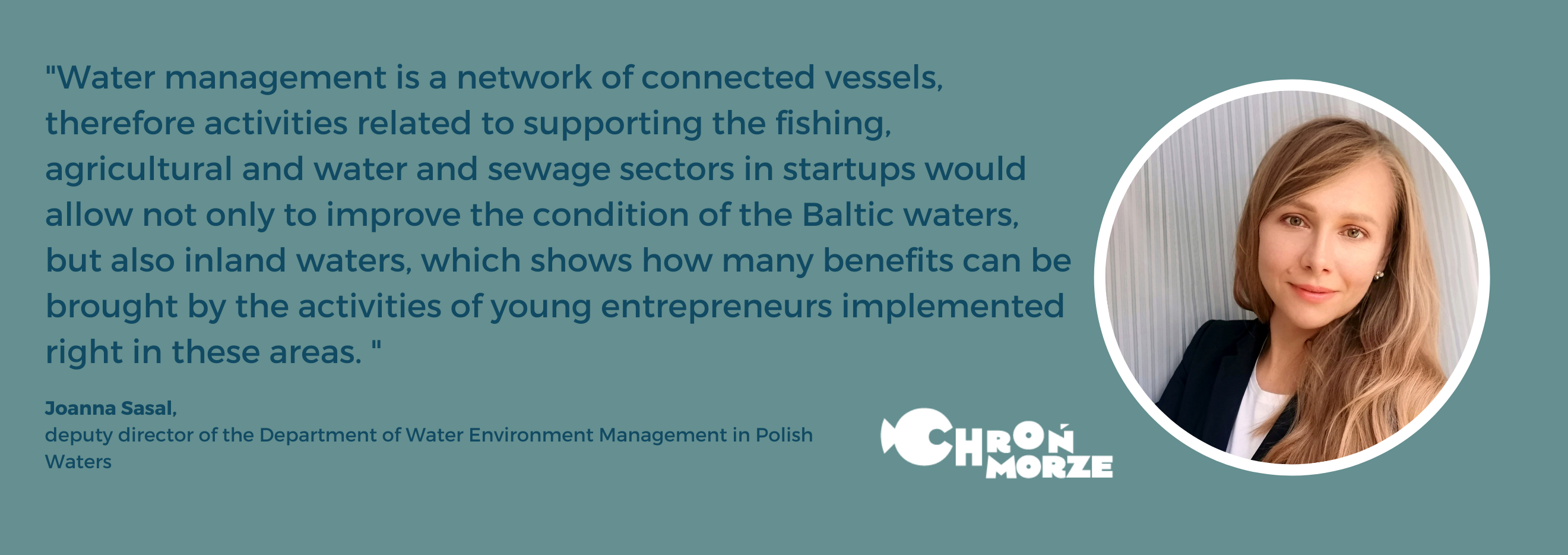





Speaking of the Baltic Sea, we see a low salt, relatively shallow and practically inland sea in the heart of Europe, the condition of which is influenced by the inhabitants of the countries included in its catchment area, as well as the specific hydrographic characteristics and climate changes. Startups that could help to improve the condition of the Baltic Sea are those that would provide solutions to cross-sectoral problems, enabling effective action to improve the condition of the Baltic Sea and implementation of solutions also at the international level.
The key problem that the Baltic states, including Poland, have to face is the reduction of agricultural pressure, which is largely responsible for the recurrent blooms of cyanobacteria and the fertilization of the waters of our sea, leading to the deterioration of its condition and, consequently, the death of life in the Baltic Sea.
The role of young, innovative companies in saving the Baltic Sea is also noticed by Polish Waters, as the MamStartUp portal writes about in the article What solutions can help the Baltic Sea? In response to the question of the portal’s editor about how startups could help, the Deputy Director of the Department of Aquatic Environment Management, Joanna Sasal: – Startups promoting innovative solutions in agriculture, helping to reduce the load of nutrients reaching our waters or technological solutions improving the quality of the waters of the sea itself they would undoubtedly help the Baltic Sea. Similarly, those whose task would be to develop solutions for the effective capture of pollutants – e.g. solid waste from the Baltic Sea, including unmarked ghost nets that drift in the water depth or remain anchored on the bottom, posing a threat to entire marine ecosystems. Water management is a network of connected vessels, therefore activities related to supporting the fishing, agricultural and water and sewage sectors in startups would allow not only to improve the condition of the Baltic Sea waters, but also inland waters, which shows how many benefits can be brought by the activities of young entrepreneurs implemented just now. in these areas.

Startups promoting innovative solutions in agriculture, helping to reduce the load of nutrients reaching our waters, or technological solutions improving the quality of the waters of the sea itself, would undoubtedly help the Baltic Sea. Similarly, those whose task would be to develop solutions for the effective capture of pollutants – e.g. solid waste from the Baltic Sea, including unmarked ghost nets that drift in the water depth or remain anchored on the bottom, posing a threat to entire marine ecosystems. Water management is a network of connected vessels, therefore activities related to the support of the fishing, agricultural and water and sewage sectors in startups would allow not only to improve the condition of the Baltic Sea waters, but also inland waters, which shows how many benefits can be generated by projects implemented in these areas. areas.
PGW Polish Waters has prepared a draft program for the protection of sea waters, which includes activities in such areas as agriculture, fisheries and wastewater management. The overriding goal is to plan the most effective actions to minimize the pressure we exert on the Baltic Sea. On the one hand, we have an ecological aspect, and on the other, further restrictions that we must introduce, for example, for farmers or fishermen. The greatest difficulty is the fact that these are sectors that are already subject to high requirements, but still, for example, as in the case of eutrophication – too much pollution comes from agriculture and, secondly, from wastewater treatment plants. Hence the need to introduce measures to reduce nitrogen and phosphorus loads for the protection of the Baltic Sea. The support and operation of scientific communities, academia, think-tanks and startups is an expert solution to the challenges of the good condition of our country’s waters.

